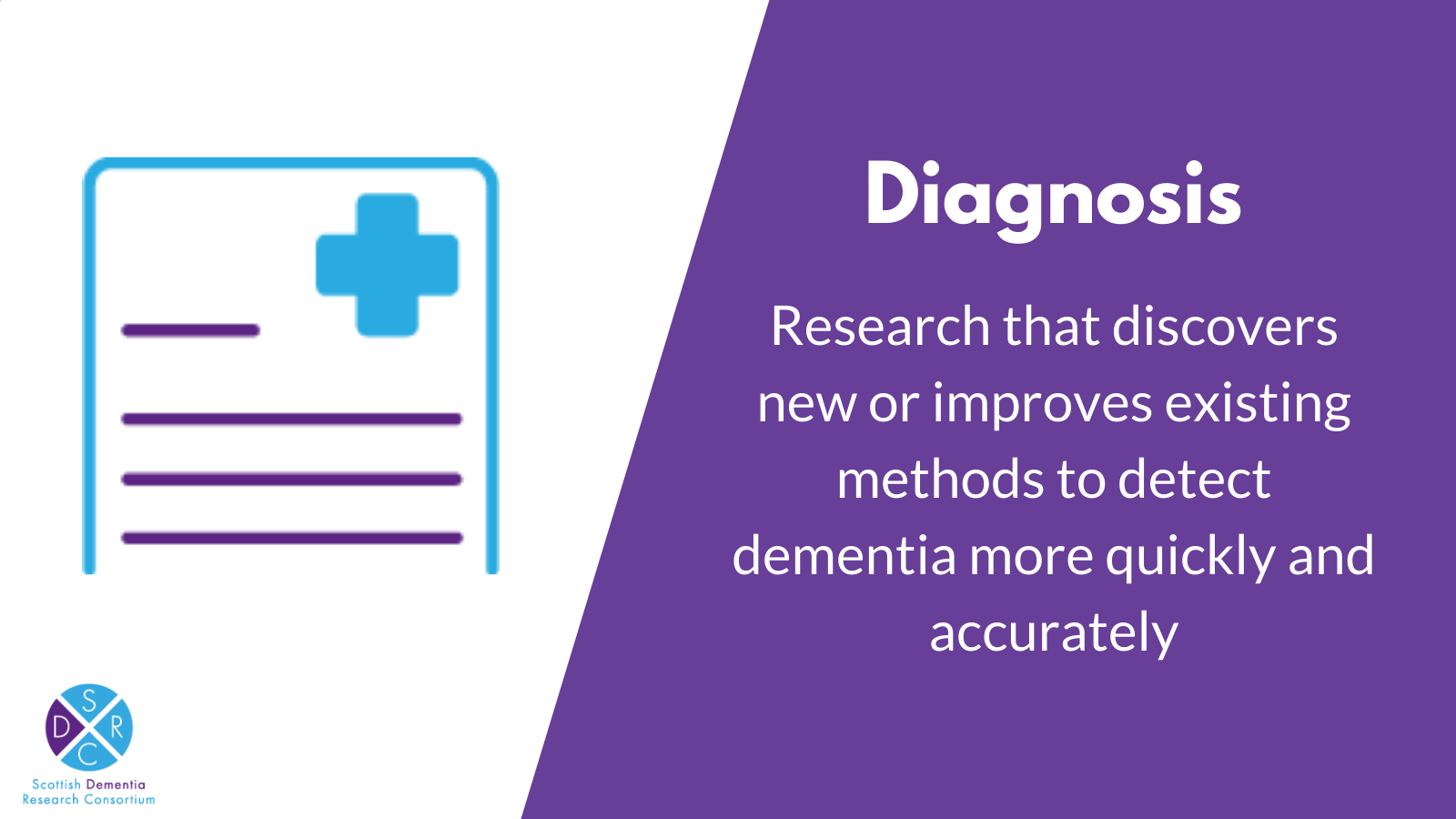This blog is an extract from the SDRC Annual Report 2021/22, dedicates a section to the progress and ongoing work of each of the SDRC research themes. This blog is from the Diagnosis theme, written by theme lead Dr Terry Quinn.
Twelve months is a long time in dementia research. Since our last SDRC report there have been major developments in dementia research and care. The biggest headlines have concerned new treatments, but we shouldn’t forget about diagnosis and assessment. After all, the first step in managing dementia, and other memory related problems, is making an accurate diagnosis.
The diagnosis theme is focused on the evaluation of new tests and improving our use of established tests. This is the theme that ‘tests the tests’ and ‘assesses the assessments’. Early and accurate diagnosis is a fundamental part of dementia management. If diagnosis is done well, it can help people make sense of symptoms; can help select the right treatments and can help in planning for the future.
The diagnosis theme is not only concerned with making a diagnosis of a dementia syndrome. Tests and assessment are important at all stages of the dementia journey, from biomarkers to look for the earliest signs of brain health problems, through to assessments that help us treat and monitor those people living with advanced dementia. Within our remit is everything from technical development of new brain scan protocols through to studies of how to share a potential dementia diagnosis with a person and their family.
Work happening in theme
In the diagnosis theme, we have tended to major on new technologies such as neuroimaging and tissue biomarkers. However, applying scientific rigor and critical appraisal is just as important when thinking about established tests that are used in clinical practice. It is sometimes surprising how little robust evidence supports routine diagnostic strategies in dementia care. The diagnosis theme has played a part in raising awareness of the need for more research into clinical diagnostic pathways. Theme members have been assisting the Scottish Intercollegiate Guideline Network (SIGN) in their new dementia guidelines.[1] The guidelines are still a work in progress, but key questions on topics such as use of cognitive screening tests, remote cognitive assessment, imaging and biomarkers are all planned. In the theme we also helped give context to the recent Brain Health Scotland and Alzheimer’s Scotland Scoping Report looking at memory services across Scotland. With regard to diagnosis there was substantial variation in practice around brain imaging, while biomarker and genetic testing was rarely used.[2] This all points to the need for research to inform guidelines and pathways.
One of the real strengths of Scottish dementia research is our track record of bringing together experts from very different areas to work in collaboration. This is especially true in diagnosis research, and the theme is proudly multi-disciplinary. One of our functions is to bring together researchers from differing backgrounds to help progress the diagnosis research agenda. We have been working with the ENRICH team (Enabling Research in Care-Homes) [3] and have supported a project looking at accuracy of dementia diagnosis in care-homes. We have also had a long partnership with the Cochrane Dementia Group [4], and through SDRC were able to find authors for recent Cochrane reviews looking at telephone and videocall based dementia assessment. As well as supporting established research teams, we also help develop new teams. For example, we helped researchers based in University of West of Scotland connect with collaborators for a project looking at post diagnostic intervention and we helped the team from University of Edinburgh access methodological advice for their paper looking at Motoric Cognitive Risk – a paper that was awarded the Royal College of Psychiatry Scotland 2021 Research Prize.[6] Creating and supporting research networks is at the core of SDRC and we support resources such as the ‘expert portal’ and mentoring.[5] Links to all of these and more are on our website, if you think we can help with your diagnosis research – please get in touch.
In SDRC we collect data on grant income from Scottish dementia projects, and then categorise by themes. In 2021, projects related to the diagnosis theme generated over £1.5 million pounds of grant funding. This would be a substantial amount at any time, but in the context of the disruption caused by the ongoing global pandemic this is an incredibly impressive achievement. Of course, we can’t be complacent. It seems likely that the research effects of the pandemic will be felt for some time yet and we need to ensure that evidence-based, and person-centred diagnosis of dementia remains a research priority. So, for 2022 and beyond, we need to continue the tradition of innovative, high-quality, collaborative diagnosis research in Scotland.
REFS
- https://www.sign.ac.uk/our-guidelines/
- Brain Health Memory Service Scoping
- https://www.nhsresearchscotland.org.uk/research-in-scotland/facilities/enrich
- https://dementia.cochrane.org/
- https://www.brainhealth.scot/diagnostic
- https://alz-journals.onlinelibrary.wiley.com/doi/10.1002/alz.12547
- https://www.sdrc.scot/conference
- https://www.sdrc.scot/technologies-for-prevention-workshop
Find out more about the SDRC research themes here

